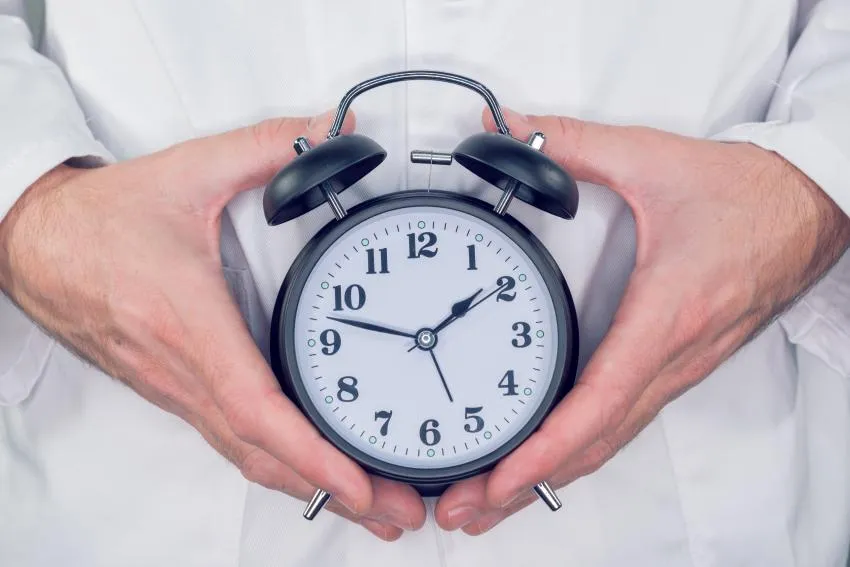How To Consistently Get Better Sleep
Sleep is as mysterious as it is necessary. We spend 1/3 of our lives with our eyes closed as we float through abstract subconscious thoughts.
Sleep is vital and is like plugging in your phone to recharge. It repairs worn and tired muscles while refreshing and resetting your mind.
Getting enough sleep every night is only half the battle, there may be a few habits impeding on your ability to have a good night’s sleep.
Here are 10 ways you can improve your quality of sleep.
1. Keep a regular sleep schedule

Circadian rhythm, in short, is your body’s natural sleep regulator. It keeps the schedule of your sleep and wake cycles.
Maintaining your circadian rhythm is important for overall sleep hygiene and health. In fact, daylight savings time events have been linked to an increase in heart attack rates.
According to a study from the American College of Cardiology, there's been as high as a 25% spike in the number of heart attacks in the days proceeding the spring forward event
Youtuber by the name of Chubbyemu explains this phenomenon further in his video:
On average, I tend to get up around 6:00-7:00 A.M. A few weeks ago, however, I woke up close to noon. Needless to say, my whole day was off: I was irritable, impatient, and overall in a sour mood all day.
We are creatures of habit and we like to be on a set schedule. It's not only our personal preferences but also imperative for a healthy balance between your body and mind.
2. Don’t drink alcohol before bed

This one sounds like a drag, but it’s one of the most important factors in your overall quality of sleep. You may have had nights involving copious amounts of alcohol. Those nights you may (or may not) remember falling asleep faster than usual.
While that may seem to be the case, it is not.
Alcohol can play a factor in the amount of time it takes you to fall asleep, but it can greatly interfere with how much you wake up at night.
I remember nights where I would drink an excess of alcohol and go to sleep shortly after. These nights I would fall asleep relatively fast, but I would wake up an average of 3 to 4 times.
The day following I was lethargic and I couldn’t focus efficiently on anything. I would crave and over-indulge in caffeine late through the day.
Binge drinking can result in your liver playing catch up. As you may remember in your middle school health class, one alcoholic drink takes about one hour to metabolize in the liver.
If you binge drink it will take your liver a greater amount of time to metabolize the alcohol. That, in turn, will cause you to lose the amount of time your body participates in REM sleep. Getting enough REM sleep is essential as it is the sleep cycle in charge of repairing your brain.
So cut out that nightcap and grab a glass of water instead.
3. Try to get exercise every day

Some may start sweating just by reading the heading, but sometimes the truth makes you sweat.
So does exercise!
The Sleep Foundation suggests that more than half of people who engage in light to vigorous exercise a few times a week achieve a better quality of sleep.
There was a time in my life where my physical activity was little to none. I would lay awake in bed at night worrying about the amount of sleep I'm losing with every passing minute.
It’s like I had this extra energy only to come forth when I slipped underneath the covers. It wasn’t until I got myself moving again that this energy disappeared.
Exercise stimulates the mind and burns excess energy. Even ten minutes of exercise a day could help tremendously. So if you can spare the time, get up and go for a walk around the block.
Try not to exercise too close to the bed as it can stimulate your brain well after you lay down.
4. Avoid screen time before bed

In the world we now live in this may be the hardest one to practice. Nearly everyone in the first world has a screen sitting in their pockets. Screens are also the focal point of many workplaces and the main way we unwind after work.
Consequently, so much screen time can have adverse effects on your sleep.
Most screens emit blue light. Blue light stimulates the mind and promotes alertness. During the day this may not seem like an issue, but if you want to slip into sleep promptly, this will become an issue.
There are ways to combat this, though.
Phones have an option in their settings called night mode. This setting will switch your phone’s bright blue light to a warm cozy tint. This light is less stimulating and helps take the strain off your eyes.
This does not mean that you will be able to glue your eyes to your phone or TV minutes before you go to bed.
Ditch the screens an hour or more before bed. Try to read a book or listen to music. Anything that is relaxing and avoids screens is highly recommended.
One thing I have personally discovered as of late is blue-blocking glasses. If you don’t wear prescription glasses and have to stare at a screen for hours a day, these glasses will filter out the blue light emitted by screens as well.
5. Keep a well-balanced diet

You are what you eat is a cliche, but it posses a substantial amount of truth. What you put in your body is your fuel. Like any gas tank, the right fuel helps a machine run efficiently.
A diet with high levels of sugar, salt, and saturated fat will negatively affect your sleep. Eating right before bed can also cause inadequate sleep as well.
Your body needs about three to four hours to digest. Falling asleep during this time hinders your ability to digest food causing discomfort and resulting in sleeplessness.
Stop me if you heard this before: try to eat fruits, vegetables, nuts, and fish. These foods promote a healthy diet which leads to positive production throughout the day and ultimately leading you to a good night’s sleep.
I know it’s difficult to avoid addicting foods that are high in sugar, salt, and fat. Don’t think you need to cut them out of your life completely, though. Sometimes you should reward yourself with rich, indulgent foods. But there’s an emphasis on sometimes.
Making these foods a treat rather than a necessity will benefit your body and your mind.
6. Keep your room cool
According to Sleep Foundation, the ideal temperature of a bedroom falls around the mid-60s.
Our body temperature fluctuates throughout the day. As the night comes, your body temperature drops along with it. Furthermore, melatonin is also released creating a cocktail for sleep.
When our rooms are too hot, this biological routine is disrupted. This disruption causes fatigue while deterring you from drifting off.
It may be difficult to always keep your room cool. Here are a few tips to control the temperature In your room on a dreadfully hot day:
- Keep your blinds closed
- Keep the air circulating with a fan
- Keep windows closed on humid days
- Open the window on cool days
- Keep the door open if larger rooms are cooler
7. Have your goals and to-do list written down
Our lives are constantly busy. The never-ending assignments, projects, and errands to run are constantly nagging us in the back of our minds. All this worry floating around will cause troublesome sleep habits.
Too many times I would lay awake thinking about what needed to be done the following day. I would go through a mental list. This didn't solve any problems for me as I would just lose sleep counting worries instead of sheep.
Writing what you need to get done on paper can solve this.
Writing down your to-do list and displaying it in an easy-to-see spot will keep all your tasks organized and right in front of you. Checking off this list one by one is satisfying as well.
A sense of accomplishment is felt as the list dwindles giving you a clear list and a clear mind heading off to sleep.
8. Separate your workroom and your bedroom

As remote work is increasing in popularity, this might one might be a little tricky. When you first picture working in your bedroom, you imagine just waking up and pulling that laptop right onto the bed.
With the fastest commute time being found right where you wake up, consequently, the opposite is found when it comes to sleep time.
Our brains like to make associations and pick up on patterns. If we work next to where we sleep, eventually our brains will better associate it with work. Having this work-related association near our blocks our association with sleep in that room.
It's best to set up your workspace in a different room. This may be difficult depending on your situation. If it's feasible, though, it will pay off in the long run.
9. Keep plants in your room

Plants and animals have a symbiotic relationship. Without each other, we wouldn't be able to breathe. While most plants exist outside there are benefits to having plants in your house.
Plants are a calming aesthetic. The rich, green leaves soothe our eyes while the earthy smell provides a relaxing aroma. Not only is the aroma nice, but it can also be good for our breathing.
A study from MATEC shows that some house plants can reduce C02 in the home by as much as 14% depending on the strength of light and type of plant.
The reduction of CO2 produces cleaner air to breathe, in turn helping the ease of sleep.
10. Limit your naps

This one might be a deal-breaker for some, and understandably so. Naps are essential and even healthy in some cases, in moderation of course.
However, the moderation comes in the form of time napped, not so much if you take a nap every day or not.
An Oxford study showed that a 10-minute nap was the most effective with increasing cognitive performance while decreasing fatigue for as much 2 1/2 hours after awakening.
Set an alarm, though. Napping for more than 30 minutes can increase fatigue and prolong grogginess while negatively affecting your sleep during the night.
Time to hit the hay
In conclusion, practicing these may seem daunting, but it doesn't have to happen overnight.
Changing even one of these habits at a time will show results. Utilizing these practices of getting better sleep will promote a longer and healthier quality of life.

Opinions and Perspectives
The sleep schedule tip is most important in my experience. Everything else falls into place after that.
Started with the easiest tip first. Small changes really do add up over time.
Would love to see more specific research citations for some of these recommendations.
Interesting read but I think everyone's sleep needs are different. What works for one might not work for all.
These tips along with a weighted blanket have transformed my sleep completely.
The workspace separation tip is crucial. Finally moved my desk out of my bedroom last month.
Its amazing how interconnected all these factors are. One change leads to another naturally.
Implementing these changes gradually has been key for me. Rome wasn't built in a day!
Started following these tips three months ago. My energy levels are noticeably better.
Finding the right balance with naps is tricky but worth figuring out. Set those alarms!
The to-do list tip combined with journaling has helped calm my racing thoughts at night.
Been doing the cool room thing for years. Can confirm it works wonders for sleep quality.
The CO2 reduction from plants is fascinating. Nature really does know best.
Great tips but they seem aimed at people with traditional schedules. What about shift workers?
I keep my phone in another room at night. Tough at first but now I sleep much better.
Really appreciate the practical approach of this article. These are all doable changes.
The bit about daylight savings affecting heart attacks is eye-opening. Why isn't this more widely discussed?
Morning routines definitely affect night sleep. Maybe we need an article about that next!
These tips are solid but I wish there was more emphasis on morning routines too.
I combined the plant and cool room tips by getting a small fan near my plants. Double benefit!
Keeping the room cool has been life changing for my sleep quality. Worth the extra energy cost.
The exercise tip works but timing is crucial. I learned the hard way not to work out right before bed.
Yes! I find it harder to maintain good sleep habits during summer when its light out longer.
Anyone else notice seasonal changes affecting their sleep despite following these guidelines?
Try replacing your nightcap with chamomile tea. It's relaxing without the negative sleep effects.
Still struggling with the no alcohol before bed rule. It helps me relax though I know it's not ideal.
The regular sleep schedule is harder than it sounds. Especially with young kids!
Spider plants and peace lilies are excellent choices. Both are great air purifiers and pretty low maintenance.
Would love to see more specific plant recommendations for bedrooms. Any suggestions?
I implemented these changes and my sleep score on my fitness tracker improved by 30%!
The plant suggestion is great but be careful with plant choice. Some can be toxic to pets.
Interesting that a 10-minute nap is optimal. I've been doing 30 minutes and always feel groggy after.
Not sure about ditching screens completely before bed. Maybe we could focus on reducing time instead of eliminating?
The suggestion about keeping a to-do list really works. My anxious thoughts have decreased significantly at bedtime.
Good point about alcohol affecting sleep. I stopped my nightcap habit and feel much more refreshed in the mornings.
The article could have mentioned sleep tracking apps. They've helped me understand my sleep patterns better.
Anyone else notice their sleep quality improve dramatically after regular exercise? It's been transformative for me.
The workroom separation tip is crucial. I turned my walk-in closet into a mini office to avoid working in my bedroom.
Try gradually lowering the temperature. Your body will adjust over time and you might actually prefer it cooler.
I love my warm bedroom though! The cool temperature suggestion is going to be hard to follow.
My doctor actually recommended many of these same tips. The medical community seems pretty unified on these principles.
The daylight savings time heart attack statistics are terrifying. We really need to reconsider this practice.
Does anyone else find it ironic reading this article on a screen right before bed?
Start with one change at a time. I began with the regular sleep schedule and added others gradually.
Never thought about the CO2 reduction from plants affecting sleep quality. Adding this to my shopping list!
The point about alcohol is tough to swallow but true. My sleep tracker shows terrible quality sleep after even one glass of wine.
I wish the article had addressed sleep supplements like melatonin. Anyone have experience with those?
You can still apply most of these principles, just adjust the timing to your schedule. The key is consistency.
What about people who work night shifts? These tips seem geared toward typical 9-5 workers.
The 10 minute nap study from Oxford is fascinating. Been trying it at work and it really helps with afternoon productivity.
Cannot stress enough how important the diet part is. Since cutting out late night snacks, my sleep has improved tremendously.
Interesting point about nap duration. I always thought longer naps were better but now I see why I wake up feeling worse.
The article doesn't mention white noise machines. I find mine essential for good sleep.
I found that writing down my to-do list before bed helps quiet my racing mind. Such a simple but effective tip.
Snake plants are great for bedrooms! They release oxygen at night and are very low maintenance.
Plants in the bedroom is interesting but I worry about allergies. Anyone have experience with this?
The part about separating workspace from bedroom is crucial. Since working from home, my sleep has gotten worse because I work from my bed.
I use them and they make a huge difference, especially during late night work sessions. My eyes feel less strained.
Anyone tried those blue light blocking glasses mentioned in the article? Are they worth the investment?
You might be too tired because of poor sleep quality. It's a vicious cycle but even a short walk can help break it.
Really struggling with the exercise suggestion. After work I'm just too tired to move!
The cool room temperature tip is spot on. I invested in a smart thermostat that automatically lowers the temperature at night and my sleep has improved dramatically.
I disagree about the no screens before bed rule. I've been watching TV before sleep for years and have no issues sleeping.
Keeping a regular sleep schedule has been a game changer for me. Even on weekends, I try not to sleep in more than an hour past my usual wake time.
The statistic about heart attacks increasing during daylight savings time is shocking. Makes me wonder why we still do it.
I've been struggling with insomnia lately and these tips seem really practical. Going to start with the regular sleep schedule first.
This article really opened my eyes about my terrible sleep habits. I never realized how much alcohol affected REM sleep!
